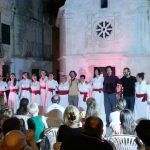Is there a future for him in Croatia?
As part of the Croatian team, Petar Slaviček (17) from Hvar last week became European champion in robotics. The same team has already won a bronze medal in a competition with the best teams in the world. However, the greatest challenge still awaits him – the World Championships in Japan, reports Slobodna Dalmacija on March 7, 2017.
The story of the third grade student of the high school in Jelsa is even more interesting if you know that he did not have computer sciences as an elective course in his school, because in his generation there was not enough interest to form a group. He therefore had to learn computer programming on his own, and when he became good enough he joined the Croatian Robotics Society. His passion has forced him to spend his weekends on the road. Almost every weekend, he has to travel from Jelsa to Zagreb and back – a two-way trip 14 hours long, plus waiting time between transfers.
“When I have classes in the morning, my professors allow me to leave the school after fourth class. My mum takes me with her car to the port in Stari Grad, where I get on the ferry to Split at 11:30. It take me two hours, and when I get to Split I buy a bus ticket to Zagreb, which is another five hours. Although I do not like to study in the bus, I often do not have a choice”, says Petar, who finds time during his weekend adventures to do what he likes, which is to develop and program a variety of games and experiments.
Although he is thinking about going abroad to study, the most likely option is the Faculty of Electrical Engineering and Computing in Zagreb. Still, when thinking about somewhat more distant future, he is still not sure what he would like to do, but is certain that it will have something to do with software development.
“I have always been fascinated by the idea of artificial intelligence because it seems to me that the so-called ‘machine learning’ is one of the most elegant solutions for majority of complex problems. I doubt that I will stay after university in Croatia for long, because here I cannot find what I am looking for. Only if something changes in the meantime”, says Petar, who likes living on an island, since it offers him “peace to clear the head”.
Even when he was a small child, he would use a screwdriver to open and examine all of his toys. He noticed early that he was interested in computer programming, and he started learning computer languages C and C ++ via the internet and books. His interest for robotics developed a little bit later, when his father bought him his first Arduino board, which is a link between programming code and visible results.
“I studied all the available online materials, and internet immediately showed me the enormous potential of such a small board, which was enough for me to become almost addicted to it. It opened the doors to the world of microcontrollers. Interest in assembling robots based on the Arduino board developed when, upon the invitation from my former mentor, professor Katija Barbić, our school was visited by Ivica Kolarić, the current manager of our robotics team and the Croatian representative at the World RoboCup. My current mentor Zoran Pribičević invited me to join his team, because at the time I was one of only a few people my age who were able to use C++”, says Petar, who believes that Croatian education system puts too much focus on useless information, without providing support for more talented students.
“We definitely learn too much irrelevant material. It all comes down to memorizing information in order to obtain best possible marks. We then forget everything because we have to learn for our next exam. This educational system kills ability to think logically. Of course, it is good to have some basic foundation in all areas, but instead of learning about the composition of some algae, it would be better for a future mathematician or programmer to learn something that will benefit them”, says Petar.
“Competitions in the soccer category look the same as you would expect a football competition to look like. We have a miniature soccer field, each team has two robots, and the winner is the one which scores the most goals. The ball is a special device that emits infrared light at a certain frequency. For this reason, our robot has 13 infrared sensors to detect the ball, in addition to four ultrasonic sensors, eight reflective IR sensors and the so-called IMU, which measures the movements and rotation of the robot. We use four very fast engines with multidirectional wheels which allow the robot to move in all directions. In global competitions, one halftime lasts for 10 minutes. The competition is organized in a league system, which means that there is no knock-out competition, but you instead collect points”, explains Petar.
Interestingly, Petar does not support the recent initiative to crowdfund money to buy robots for Croatian schools. “The idea of ‘STEM revolution’ definitely makes sense since it attempts to motivate today’s youth, but I think that the approach is wrong. We can start a revolution if we develop passion for learning about the technology, but that cannot be achieved by supplying schools with various devices because they will, which I can hear from my colleagues at various Croatian schools is already happening, just stay on the shelves if there is no real initiative. In order to motivate a child, you need only one computer and a motivated educator, and not 300,000 dollars worth of equipment. The money should instead be invested in people willing to lead the next generation of computer scientists”, says Petar.
On Sundays afternoon, shortly before 3 pm, Petar is at the Zagreb bus station waiting for a bus to Split. Upon arrival, he rushes to catch a ferry to Stari Grad, and comes home around 11 pm.
And what did you do last weekend?











